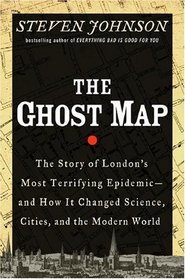Helpful Score: 5
Compelling history of a cholera epidemic in London in 1854, a time when people did not know that bacteria and viruses cause disease, a time when there were no sanitary sewers, so waste products were simply dumped in the backyard or the basement. Author lost me a bit in the last 1/3 of the book when he began to speculate about the future and run on a bit about city structure, but the first 2/3 is a first class read.
Helpful Score: 2
The first 85% of this book is very good. I really enjoy historical renderings of medical cases or scientific/technological discoveries, and this recounting of the cholera epidemic in London did not disappoint.
If the book would have ended with the conclusion of the medical mystery, I think I would have been content. But the last few chapters of this book transition from a historical retelling of the cholera epidemic to the author's opinions and predictions regarding past, present, and future outbreaks of various disease processes and epidemics. While these discussions are somewhat relevant in light of the way in which the cholera epidemic was handled, it is not an ending that I preferred. Perhaps it was just because I wansn't really expecting it.
Author opinions aside, I thought that this book did a very good job of following the historical events that surrounded the cholera outbreak at the Broad Street pump. Because of that, I do recommend this book to anyone who enjoys factual but well-written medical history of the 19th century.
If the book would have ended with the conclusion of the medical mystery, I think I would have been content. But the last few chapters of this book transition from a historical retelling of the cholera epidemic to the author's opinions and predictions regarding past, present, and future outbreaks of various disease processes and epidemics. While these discussions are somewhat relevant in light of the way in which the cholera epidemic was handled, it is not an ending that I preferred. Perhaps it was just because I wansn't really expecting it.
Author opinions aside, I thought that this book did a very good job of following the historical events that surrounded the cholera outbreak at the Broad Street pump. Because of that, I do recommend this book to anyone who enjoys factual but well-written medical history of the 19th century.
Helpful Score: 2
The difficulty in reading about centuries past is adopting the mindset of those who lived then; how can we, with our 21st century knowledge, grasp a world in which people washed their babies' diapers next to the local drinking supply and thought nothing of it? Yet, Johnson weaves such a detailed picture of London life at the time that the commonplace miscomprehensions held by both the academics and uneducated are understandable. Johnson's greatest narrative gift is capturing the extent of the devastation and its commonplace nature in 19th century London, where people lived with the constant threat of epidemic.
The last fifth of the book is given over to Johnson's theorizing about the future of city planning, trying to tie it into the work of the pioneering researchers of the cholera outbreak. This non sequitur weakens the overall book, but only slightly. The mystery is real, the medical discoveries ingenious and Johnson's research and narrative compelling.
The last fifth of the book is given over to Johnson's theorizing about the future of city planning, trying to tie it into the work of the pioneering researchers of the cholera outbreak. This non sequitur weakens the overall book, but only slightly. The mystery is real, the medical discoveries ingenious and Johnson's research and narrative compelling.




